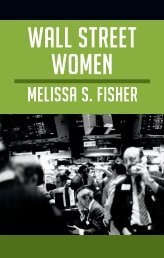Spring 2013 Catalog - Duke University Press
Spring 2013 Catalog - Duke University Press
Spring 2013 Catalog - Duke University Press
Create successful ePaper yourself
Turn your PDF publications into a flip-book with our unique Google optimized e-Paper software.
Althusser and His Contemporaries<br />
Philosophy’s Perpetual War<br />
warren montag<br />
“Warren Montag’s reconstruction of the Althusserian journey into the<br />
hazardous territories of politics and philosophy gives us a fascinating<br />
account of the Marxist philosopher’s trajectory, while illuminating his inter-<br />
actions with the major works of ‘French theory.’ There is no equivalent to<br />
Montag’s interpretation, which rectifies many conventional notions and<br />
combines empathy with absolute mastery of the archive and the concep-<br />
tual problems at stake. But Althusser and His Contemporaries is also a phil-<br />
osophical creation in its own right, delineating what I am tempted to call<br />
a negative eschatology: no doubt one of Althusser’s most exciting ‘alea-<br />
tory’ heritages.”—ÉTIENNE BALIBAR, coauthor of Reading Capital<br />
Althusser and His Contemporaries alters and expands understand-<br />
ing of Louis Althusser and French philosophy of the 1960s and 1970s.<br />
Thousands of pages of previously unpublished work from different<br />
periods of Althusser’s career have been made available in French since<br />
his death in 1990. Based on meticulous study of the philosopher’s post-<br />
humous publications, as well as his unpublished manuscripts, lecture<br />
notes, letters, and marginalia, Warren Montag provides a thoroughgoing<br />
reevaluation of Althusser’s philosophical project. Montag shows that<br />
the theorist was intensely engaged with the work of his contempo-<br />
raries, particularly Foucault, Derrida, Deleuze, and Lacan. Examining<br />
Althusser’s philosophy as a series of encounters with their thought,<br />
Montag contends that Althusser’s major philosophical confrontations<br />
revolved around three themes: structure, subject, and beginnings and<br />
ends. Reading Althusser reading his contemporaries, Montag sheds new<br />
light on structuralism, poststructuralism, and the extraordinary moment<br />
of French thought in the 1960s and 1970s.<br />
Warren Montag is the Brown Family Professor in Literature, English and<br />
Comparative Literary Studies at Occidental College in Los Angeles. He is the<br />
author of Louis Althusser and the editor of Décalages: An Althusser Studies<br />
Journal.<br />
POST-CONTEMPORARY INTERVENTIONS<br />
A Series Edited by Fredric Jameson, Michael Hardt, and Roberto Dainotto<br />
PHILOSOPHY/MARXIST THEORY<br />
May 256 pages<br />
paper, 978–0–8223–5400–0, $23.95/£15.99<br />
cloth, 978–0–8223–5386–7, $84.95/£64.00<br />
political theory/political science<br />
Making the Most of Mess<br />
Reliability and Policy<br />
in Today’s Management Challenges<br />
emery roe<br />
“If only regulators would read this book, instead of talking to each other<br />
and the businesses they regulate, we might have a chance of avoiding<br />
another major financial meltdown.”—JOHN KAY, Financial Times columnist<br />
and author of Obliquity: Why Our Goals Are Best Achieved Indirectly<br />
In Making the Most of Mess, Emery<br />
Roe emphasizes that policy messes<br />
cannot be avoided or cleaned up; they<br />
need to be managed. He shows how<br />
policymakers and other professionals<br />
can learn these necessary skills from<br />
control operators who manage large<br />
critical infrastructures such as water<br />
supplies, telecommunications systems,<br />
and electricity grids. The ways in<br />
which they prevent major accidents<br />
and failures offer models for policymakers<br />
and other professionals to<br />
manage the messes they face.<br />
Throughout, Roe focuses on the global financial mess of 2008 and<br />
its ongoing aftermath, showing how mismanagement has allowed it<br />
to morph into other national and international messes. More effective<br />
management is still possible for this and many other policy messes<br />
but that requires better recognition of patterns and formulation of<br />
scenarios, as well as the ability to translate pattern and scenario<br />
into reliability. Developing networks of professionals who respond to<br />
messes is particularly important. Roe describes how these networks<br />
enable the avoidance of bad or worse messes, take advantage of<br />
opportunities resulting from messes, and address societal and professional<br />
challenges. In addition to finance, he draws from a wide range<br />
of case material in other policy arenas. Roe demonstrates that knowing<br />
how to manage policy messes is the best approach to preventing crises.<br />
Emery Roe is a senior associate with the Center for Catastrophic Risk<br />
Management at the <strong>University</strong> of California, Berkeley. He is the author of<br />
Taking Complexity Seriously: Policy Analysis, Triangulation and Sustainable<br />
Development; Narrative Policy Analysis: Theory and Practice, which is<br />
also published by <strong>Duke</strong> <strong>University</strong> <strong>Press</strong>; and, with Paul R. Schulman,<br />
High Reliability Management: Operating on the Edge.<br />
PUBLIC POLICY/MANAGEMENT/ECONOMICS<br />
March 224 pages<br />
paper, 978–0–8223–5321–8, $22.95/£14.99<br />
cloth, 978–0–8223–5307–2, $79.95/£60.00<br />
39












